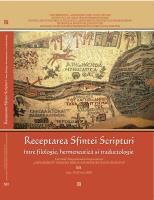„Și soarele şi luna s-au oprit” (Ios. 10:13). Perspective filologice şi duhovniceşti ale bătăliei de la Gabaon
“And the sun stood still, and the moon stopped” (Joshua 10:13). Philological and Spiritual Perspectives of the Battle of Gabaon
Author(s): Eusebiu BorcaSubject(s): Biblical studies, Philology, Translation Studies
Published by: Editura Universităţii »Alexandru Ioan Cuza« din Iaşi
Keywords: Joshua; Gabaon; the Sun stood Still; Moon stopped;
Summary/Abstract: Immediately after the Israelitesʼ entry into Canaan, after the conquest of the cities of Jericho and Ai, Joshua begins the southern campaign to conquer the territory promised by God. Placing themselves (albeit by deception) under Joshuaʼs protection, the Gibeonites are attacked by neighboring cities. Under these conditions, the battle of Gibeon takes place, where the Israelites jump to the aid of the Gibeonites, facing a coalition of five armies. The Lord himself assured Joshua that he would win because He would fight alongside the Israelites. The biblical episode was interpreted by the Holy Fathers in a spiritual Christological key, understanding by Gibeonites those Christians who, despite their zeal, remain attached to the worldly (Origen), or the Gentiles who come to Christianity and will come to salvation through faith (St. Maxim the Confessor). Joshua Navi is the typos of Christ, the ‟Sun of Righteousnessˮ, the One who ‟does not set ... undecided by the evening of sin and ignoranceˮ (St. Maximus the Confessor). This ‟extra dayˮ, which is not ‟preceded by a nightˮ, refers to the ‟darkness that will follow the crucifixionˮ (Theodoret of Cyrus), or to Christ, Who, ‟in one day ... made two, as Joshua had made two days oneˮ (St. Ephrem the Syrian). During this unique day, ‟the sun stood still, but time went onˮ (Fericitul Augustin). For Origen, this episode of the lengthening of the day, in which the ‟sun of justiceˮ (Mal. 4:2) ‟does not set at allˮ, is the image of Christʼs action by which he ‟stopped and delayed the day of the endˮ, as One who has the power to lengthen ‟the length of days, when it is the time of salvationˮ and to ‟shorten it, when it is the time of sorrow and perditionˮ (Origen).
Journal: Receptarea Sfintei Scripturi: între filologie, hermeneutică şi traductologie
- Issue Year: 12/2023
- Issue No: 1
- Page Range: 95-110
- Page Count: 16
- Language: Romanian

